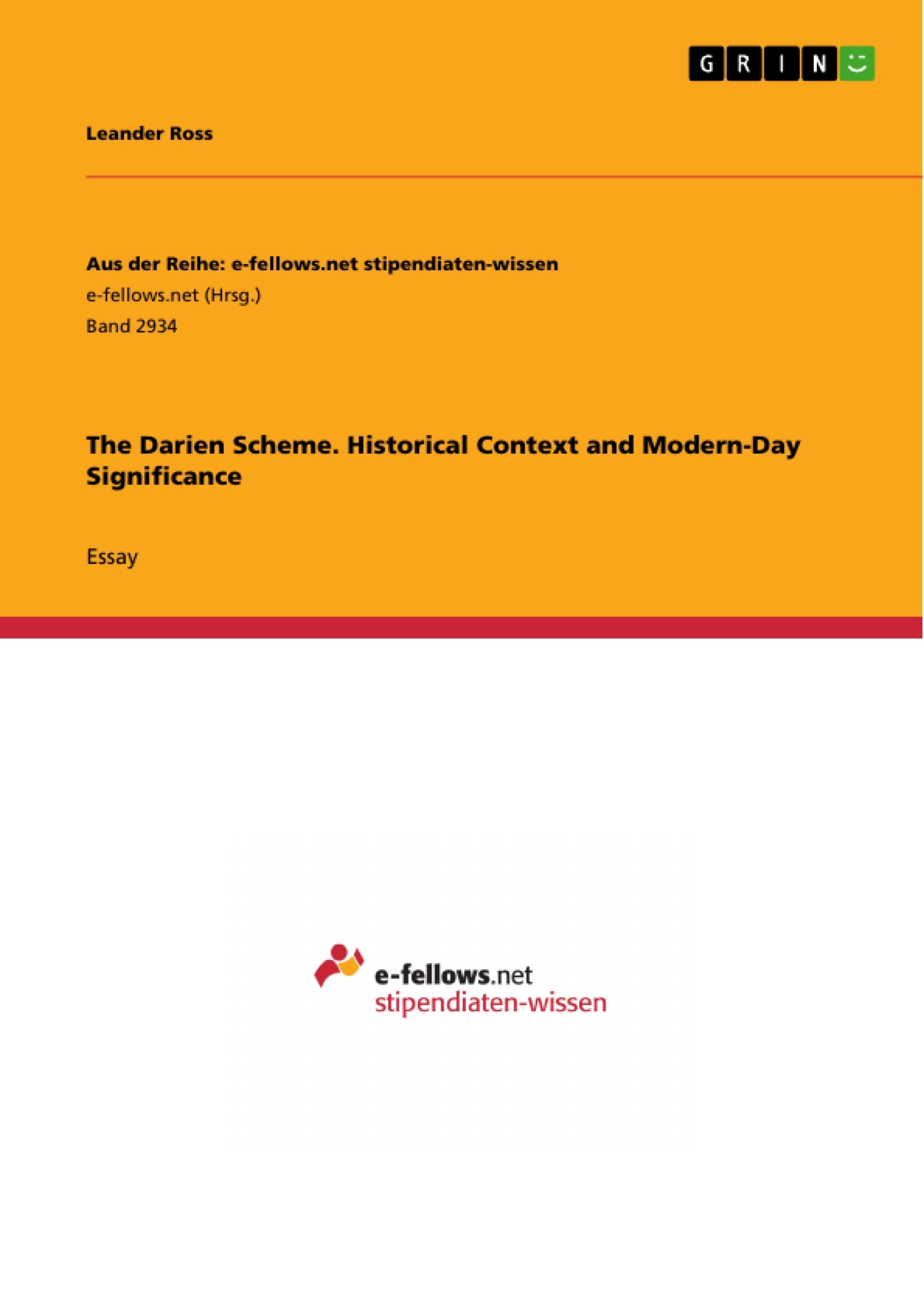This essay presents the Darien Scheme in its historical context and discusses its current significance. First the historical context of the Darien scheme will be outlined, followed by a critical discussion of whether this part of Scottish history has any significance for the Scotland of today.
In their dream of becoming one of the global players in the world and to gain economic independence and prosperity, Scotland tried to establish its own trading colony ‘New Caledonia’ in Panama in 1698. This attempt failed disastrously and was one of the reasons for Scotland’s loss of independence in 1707.
Today, the question of independence emerges once more, and critics point to Scotland’s last attempt in Darien to be an independent global player and suggest learning from history. The incomparability of context and time of the two situations is one of the arguments which can be held against this comparison. Nevertheless, arguments in favour of this comparison are the fact that it is about getting independence from England or the risk involved for Scotland’s future, both in 1698 and today.
Table of Contents
- The Historical Context of the Darien Scheme
- The Darien Scheme: A Disaster in Scottish History
- The Importance of the Darien Scheme for Today's Scotland
- Arguments Against the Significance of the Darien Scheme
- Arguments for the Significance of the Darien Scheme
- Conclusion
Objectives and Key Themes
This essay examines the historical context of the Darien Scheme, a failed attempt by Scotland to establish a trading colony in Panama in the late 17th century. The essay then critically discusses the significance of this event for contemporary Scotland, exploring both arguments for and against its relevance to the current debate on independence.
- The historical context of the Darien Scheme and Scotland's economic situation in the late 17th century.
- The causes of the Darien Scheme's failure, including economic, political, and geographical factors.
- The long-term consequences of the Darien Scheme for Scotland, particularly its role in the Act of Union in 1707.
- The comparability of the Darien Scheme to the current debate on Scottish independence.
- The potential risks and benefits of Scottish independence, in light of the historical experience of the Darien Scheme.
Chapter Summaries
- The Historical Context of the Darien Scheme: This chapter provides an overview of the economic and political situation in Scotland in the late 17th century, highlighting the country's desire for economic independence from England. It explains the motivations behind the Darien Scheme, including Scotland's ambition to become a global player and its desire to break free from English colonial dominance.
- The Darien Scheme: A Disaster in Scottish History: This chapter details the events of the Darien Scheme, focusing on the expeditions, the challenges faced by the settlers, and the ultimate failure of the project. It explores the key reasons for the failure, including disease, lack of resources, and poor planning.
- The Importance of the Darien Scheme for Today's Scotland: This chapter examines the debate over the significance of the Darien Scheme for contemporary Scotland. It presents arguments for and against the relevance of this historical event to the current debate on independence.
- Arguments Against the Significance of the Darien Scheme: This chapter focuses on arguments that downplay the relevance of the Darien Scheme to the current independence debate. It highlights differences between the historical context of the Darien Scheme and the contemporary situation in Scotland, emphasizing the improved relationship between Scotland and England and the reduced risk involved for an independent Scotland due to international alliances and Scotland's economic capabilities.
- Arguments for the Significance of the Darien Scheme: This chapter presents arguments that underscore the importance of the Darien Scheme in understanding contemporary Scotland's political landscape. It emphasizes similarities between the historical context of the Darien Scheme and the current debate on independence, including the enduring desire for Scottish self-determination, the significant risks associated with independence, and the uncertain economic prospects for an independent Scotland.
Keywords
This essay delves into the historical context of the Darien Scheme, focusing on Scotland's economic independence, colonial ambitions, and the subsequent failure of the venture. The essay then examines the relevance of this historical event to contemporary Scotland, exploring the ongoing debate on independence, the potential risks and benefits, and the historical parallels between the Darien Scheme and the current political landscape.
Frequently Asked Questions
What was the Darien Scheme?
The Darien Scheme was a failed attempt by Scotland in the late 1690s to establish a trading colony called 'New Caledonia' on the Isthmus of Panama.
Why did the Darien Scheme fail so disastrously?
The failure was caused by a combination of poor planning, lack of resources, devastating diseases, and opposition from the Spanish and the English.
How did this event affect Scottish independence in 1707?
The financial ruin caused by the scheme's failure was a major factor that pushed Scotland into the Act of Union with England in 1707, leading to its loss of independence.
Is the Darien Scheme relevant to modern Scottish independence debates?
Yes, critics often point to it as a warning about the risks of being an independent global player, while others argue the historical context is too different to compare.
What were Scotland's motivations for establishing 'New Caledonia'?
Scotland aimed to achieve economic independence from England, gain prosperity, and become a significant player in global trade.
- Quote paper
- Leander Ross (Author), 2018, The Darien Scheme. Historical Context and Modern-Day Significance, Munich, GRIN Verlag, https://www.grin.com/document/451166



